About
The University of South Carolina provides students with rich learning and performing experiences in a supportive and inspiring atmosphere. Transforming lives through excellence in music teaching, performance, creative activities, research and service is our mission.

World-class leadership.
Our faculty are dedicated to helping students achieve both musical and academic excellence as they shape their individual musical career paths.
Faculty Directory
Give back.
Help us keep the music playing! Philanthropy has a tremendous impact on University of South Carolina School of Music students, faculty and staff. Support us through gifts, partnerships and student support.
See How


